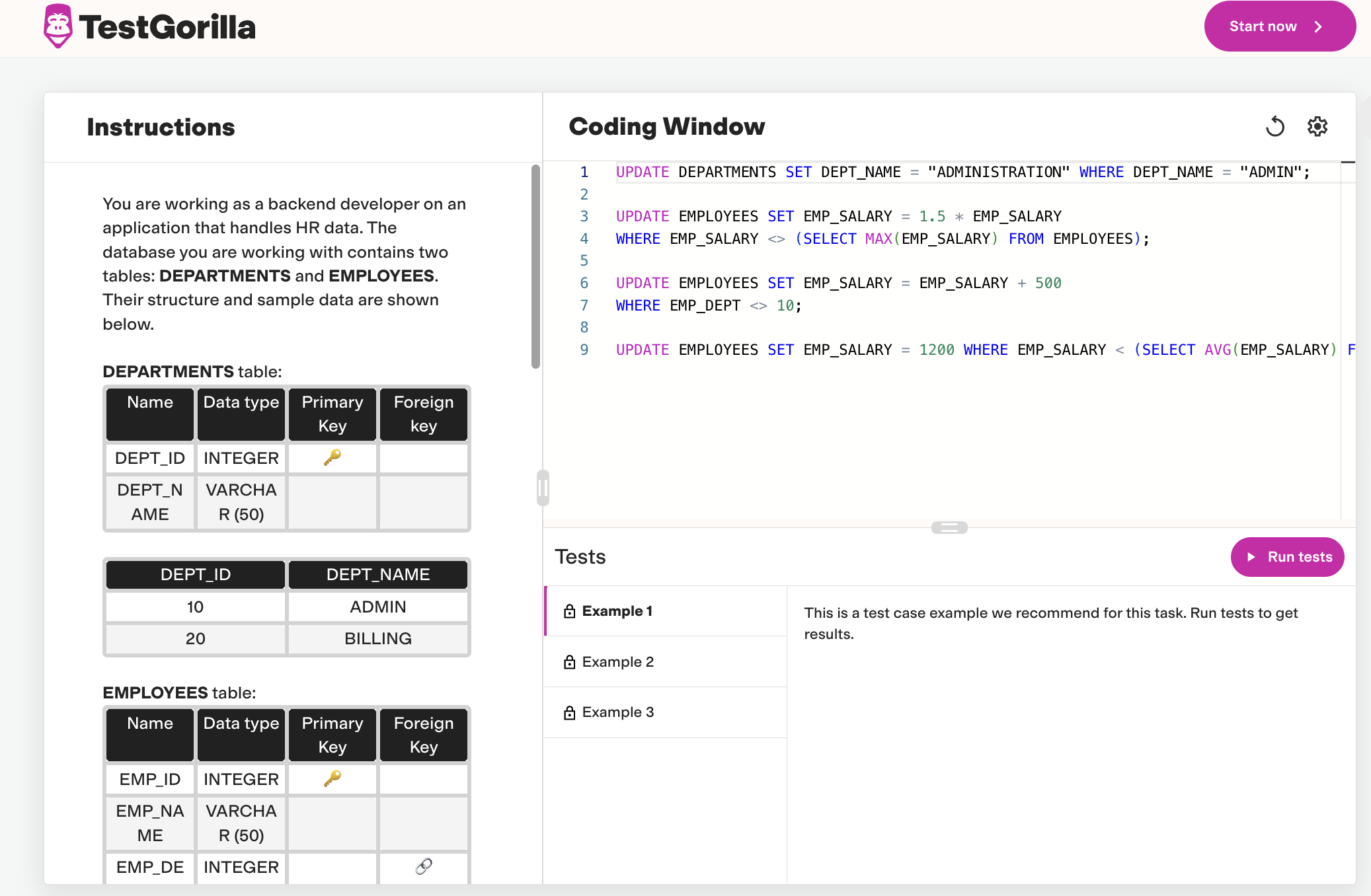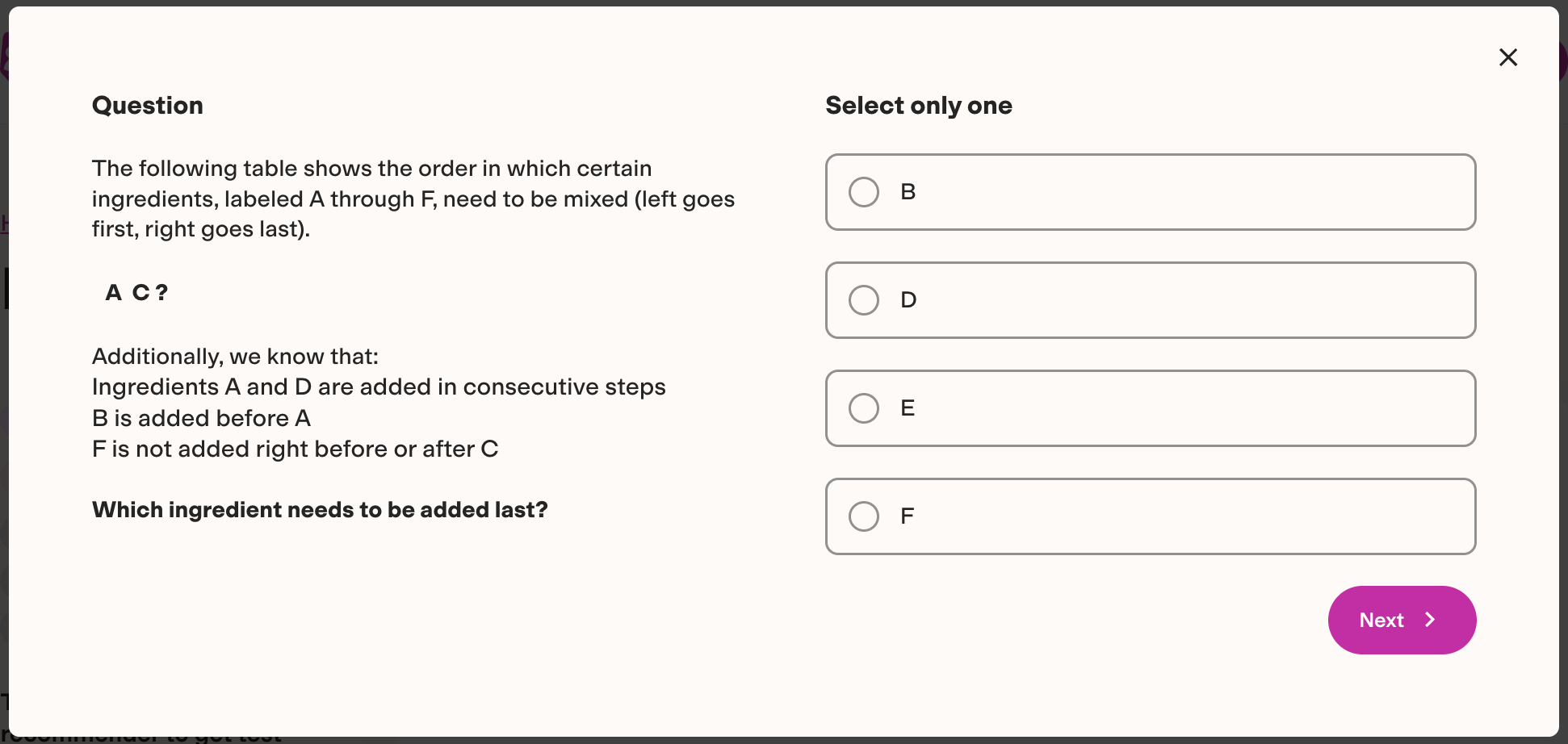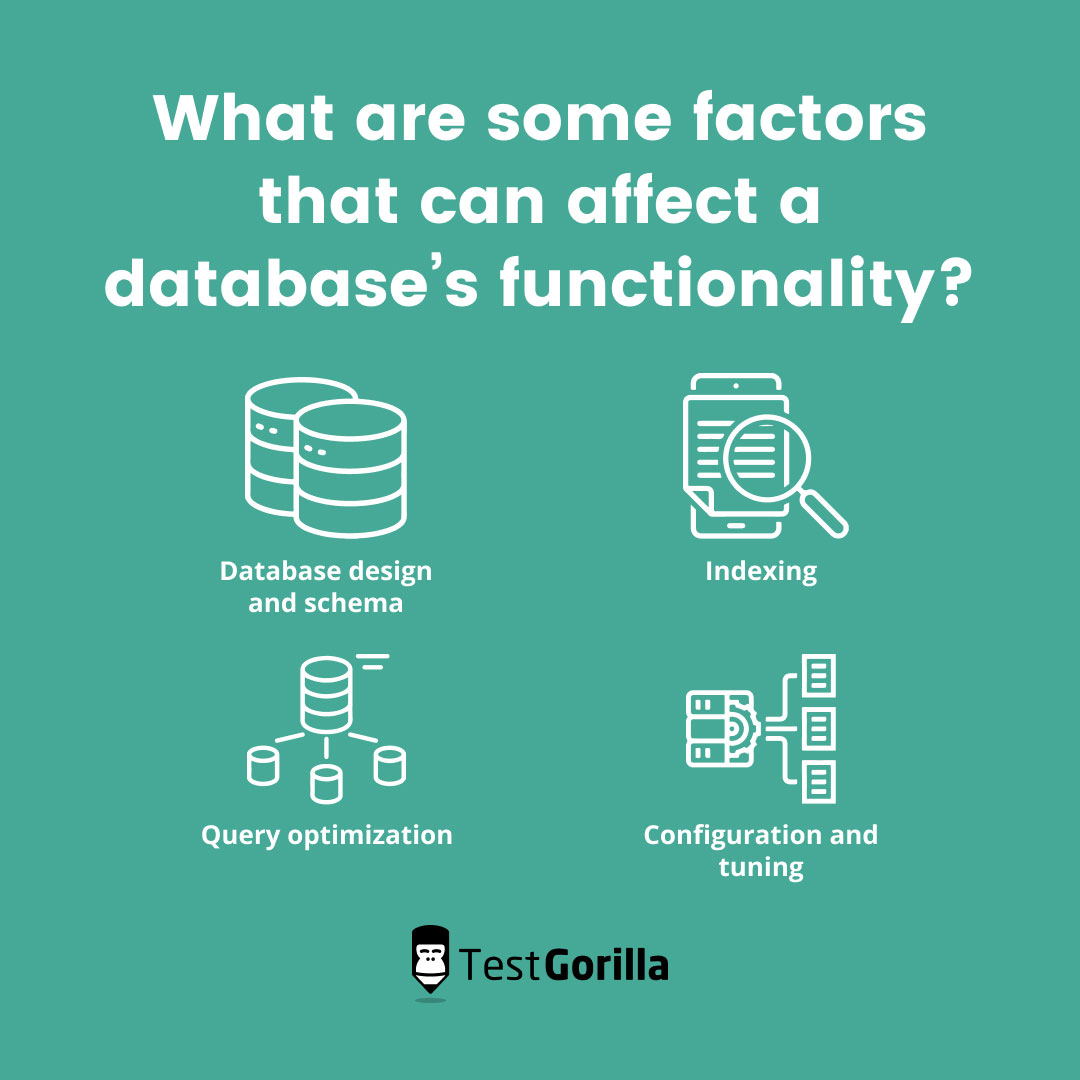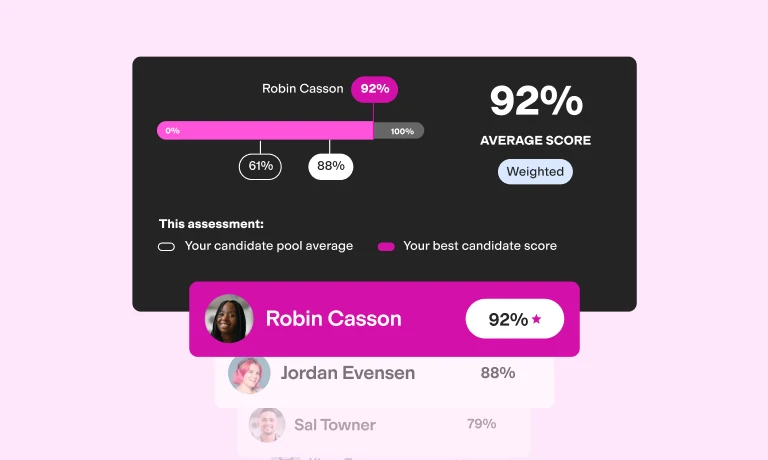18 tricky SQL interview questions to include in your hiring campaign (and answers to look for)
Make better hires and find skilled SQL developers with TestGorilla
As businesses strive to make informed, data-driven decisions, the role of SQL (Structured Query Language) experts becomes increasingly important. They can help you manage and analyze huge amounts of information quickly and efficiently, enabling you to draw conclusions from large banks of raw data.
Conducting SQL interviews enables you to identify candidates with the right skills and experience to handle your organization's database management and analysis. However, you’ll need to ask the right questions to ensure you’re finding the top talent and to avoid making a mis-hire – which can lead to its own set of problems, including higher training and development costs, low productivity, a negative workplace culture, and more.
To help you out, we’ve taken a closer look at why you should use tricky SQL questions during your hiring campaign. Then, we share 18 questions to use and provide sample answers so you understand what to listen for in candidates’ responses.
Why include tricky SQL interview questions in your hiring campaign?
Asking tricky SQL questions in your interviews can help you identify the best talent and reduce the risk of mis-hires. Here are some of the key benefits of using them.
Identifying SQL experts
At the base level, adding tricky SQL questions to your hiring campaign is a great way to assess candidates’ technical SQL skills. Since tricky questions go beyond basic concepts and delve into advanced topics, they can help you separate individuals with a basic understanding of SQL from those with more profound real-world experience.
This is important because anyone can say they have experience or knowledge that they don’t. In fact, people often embellish their resumes and claim to have more skills than they actually do in an attempt to land a job.
Simply identifying the SQL experts among your applicants can immediately help you shortlist a selection to proceed to the next stage of the interview process. You can also use more targeted questions alongside assessments like TestGorilla’s Microsoft SQL Server test and SQLite Online Skills test (preview below) to evaluate more specialized knowledge.
Assessing problem-solving and critical-thinking skills
Using tricky SQL interview questions also presents an opportunity to assess a candidate's behavioral skills and tendencies.
Two behavioral skills that are especially important for SQL positions are problem-solving and critical thinking. Experienced SQL experts should think outside the box and apply these skills to overcome obstacles. Tricky SQL questions present a great way to assess an individual’s ability to do this, as they generally require more thought and expertise than basic SQL interview questions.
If problem-solving and critical thinking are especially important for your position, you can add tricky SQL questions directly targeting these. You can also use TestGorilla’s Problem solving test (preview below) and other behavioral assessments for deeper insights.
Evaluating a candidate’s ability to perform under pressure
Adding a time limit to your tricky SQL interview questions can help you assess a candidate’s ability to perform under pressure. This ensures you hire knowledgeable applicants who can also work fast and efficiently.
With an open time limit, for example, applicants with strong SQL knowledge but a poor ability to work under pressure can still perform well. However, hiring applicants like this can reduce your business’s productivity and ultimately impact your bottom line.
Eliminating bias
A clear pre-employment screening process will help you remain objective while identifying the most appropriate candidates for your open positions. Using tricky SQL questions, you can differentiate between candidates based on their actual skills and experience rather than your personal impressions.
Just looking at resumes and using interviews, for example, is a dangerous hiring method that can result in the best candidates slipping through your fingers. With this method, the people with the best resume and interview skills will stand out rather than those with a true understanding of SQL and its applications in the workplace.
By adding pre-screening assessments that include tricky SQL questions, you can shortlist the best candidates while eliminating unconscious hiring bias.
18 tricky SQL interview questions and answers
Below, we’ve listed 18 tricky SQL interview questions that you can use to assess an applicant’s SQL knowledge and experience.
We’ve split them into a selection of theoretical and practical questions and included detailed sample answers for each.
Tricky SQL theoretical interview questions
Assessing a candidate’s base SQL knowledge through theoretical questions can help you quickly identify the most skilled individuals. Candidates who perform well on these questions likely have a strong grasp of the core concepts of SQL and how to work with databases.
Here are nine tricky theoretical SQL interview questions.
1. What is conditional aggregation in SQL? How can you use it to obtain the results you want from grouped data?
Conditional aggregation involves using a CASE statement with aggregate functions such as SUM, COUNT, and AVG to include or exclude certain rows in an aggregation. You can use it to apply different aggregate functions with specific conditions, offering a high level of control over the final result set.
2. Explain the concept of correlated subqueries in SQL. Can you provide an example of how you can use them?
Correlated subqueries are subqueries that are executed once for each row of the outer query and depend on the outer query for results. For example, you could use a correlated subquery to retrieve data from one table according to conditions in a separate table.
3. What is a self-join in SQL, and how do you use aliases with self-joining?
When a table is joined to itself in SQL, it’s known as a self-join. In simpler terms, this occurs when you reference a table multiple times in a single SQL query. Using table aliases, you can distinguish between different instances of the same table and treat them as separate tables during queries.
4. Explain why understanding NULL values is crucial to running SQL queries. How can you use the COALESCE function to address them?
Understanding and handling NULL values enables you to prevent errors and unexpected results. The COALESCE function returns the first non-NULL in a list of expressions. If there are no non-NULL values, it will return a specified default value.
5. What are the differences between clustered and non-clustered indexes?
A clustered index determines the physical order of data rows in a table and is useful for queries involving range-based searches or sequential access. A non-clustered index is a separate data structure from the table that doesn’t affect the physical order of elements in a table. These are useful for speeding up INSERT and UPDATE queries.
6. Can you explain how transposition works in SQL?
In SQL, transposition involves transforming rows into columns and columns into rows. You can use various techniques, including the CASE statement and the PIVOT and UNPIVOT operators, to achieve this.
7. What are some factors that can affect a database’s functionality?
Database design and schema. A database’s design determines how data is organized and accessed. A well-structured schema with correct indexing and normalization enhances query performance.
Indexing. Using appropriate indexing on frequently queried columns can significantly improve the performance of your database.
Query optimization. Well-structured queries that use appropriate joins, filters, and grouping can improve performance. Optimizing your SQL queries with the proper syntax and avoiding operations like full table scans can also improve your database’s efficiency.
Configuration and tuning. You can configure database settings, buffer sizes, memory allocation, and more to optimize database performance. Performing regular database tuning with actions like defragmenting indexes also helps to maintain database performance.
Additional factors that can impact performance include concurrent control, isolation levels, cashing, hardware, and network speed, among others.
8. What does the GRANT statement do in SQL?
The GRANT statement is a security feature database administrators can use to control user access and permissions. When used correctly, this ensures unauthorized users can’t access sensitive data, providing data integrity and confidentiality across the board.
9. Explain what an unsafe access sandbox is in SQL and why it’s used.
An unsafe access sandbox is a restricted environment used to execute potentially unsafe or untrusted code. It’s designed to limit the damage caused by malicious code by isolating its execution from your main databases and other data.
Unsafe access sandboxes also offer a controlled environment for you to play with custom code and test new queries without compromising your overall database security.
Tricky SQL practical interview questions
Practical interview questions can help you assess candidates' ability to use their theoretical knowledge to create functional SQL queries. Below are eight sample questions will help you understand how they use SQL to achieve the desired outcome.
We’ve provided sample answers for each question, but these aren’t necessarily the only correct answers. There are often multiple ways to achieve the same goal. In general, you must look for clear, functional code that’s written logically and concisely.
10. Write a query that delivers the names of all employees who work in the same department as the employee with the highest salary.
SELECT e2.employee_name
FROM employees e1
JOIN employees e2 ON e1.department_id = e2.department_id
WHERE e1.salary = (SELECT MAX(salary) FROM employees);
11. Write a query to calculate the 7-day moving average of sales for each product in a given range using SQL window functions.
SELECT product_id, sale_date,
AVG(sales_amount) OVER (PARTITION BY product_id ORDER BY sale_date ROWS BETWEEN 6 PRECEDING AND CURRENT ROW) AS moving_average
FROM sales;
12. Write a query to find the names of any customers who have made a purchase in all categories.
SELECT c.customer_name
FROM customers c
WHERE NOT EXISTS (
SELECT DISTINCT category_id
FROM categories
WHERE category_id NOT IN (
SELECT DISTINCT p.category_id
FROM purchases p
WHERE p.customer_id = c.customer_id
)
);
13. Write a query that retrieves products with the same name but different prices.
SELECT product_name
FROM products
GROUP BY product_name
HAVING COUNT(DISTINCT price) > 1;
14. Write a query that delivers the second-highest salary in an “employees” table.
SELECT MAX(salary) AS second_highest_salary
FROM employees
WHERE salary < (SELECT MAX(salary) FROM employees);
15. Write a query that delivers the total sales for each customer in a database, including any with no sales.
WITH CustomerSales AS (
SELECT customer_id, SUM(sale_amount) AS total_sales
FROM sales
GROUP BY customer_id
)
SELECT c.customer_id, COALESCE(cs.total_sales, 0) AS total_sales
FROM customers c
LEFT JOIN CustomerSales cs ON c.customer_id = cs.customer_id;
16. Write a query that delivers the name of any department with more than five employees, along with the average salary of these employees.
SELECT department_id, COUNT(*) AS total_employees, AVG(salary) AS avg_salary
FROM employees
GROUP BY department_id
HAVING COUNT(*) > 5;
17. Write a query that delivers a list of employees without an assigned manager.
SELECT e.employee_name
FROM employees e
LEFT JOIN employees m ON e.manager_id = m.employee_id
WHERE e.manager_id IS NULL;
18. You have a SQL database table named “orders”, with columns “order_id”, “customer_id”, and “order_date”. Write a query to update the order date for order number 2045 to “2023-07-23” and save the changes permanently to the database with the COMMIT function.
-- Start a transaction
BEGIN;
-- Update the order_date for the order with ID 1001
UPDATE orders
SET order_date = ‘2023-07-23'
WHERE order_id = 2045;
-- Commit the changes permanently
COMMIT;
The best insights on HR and recruitment, delivered to your inbox.
Biweekly updates. No spam. Unsubscribe any time.
How to assess SQL developers with tricky interview questions
Conducting interviews is a useful part of the hiring process, but it shouldn’t be the only way you identify top candidates for a position.
To make an accurate hiring decision and reduce the risk of costly mis-hires, you should use a multi-faceted hiring process that includes pre-employment screening to identify top talent.
TestGorilla boasts a library of 350+ – including ones that assess behavioral traits, SQL skills, cognitive ability, and various soft skills. You can combine up to five of these tests with a selection of custom tricky SQL questions to create your candidate screening assessment.
When hiring a SQL developer, you might like to consider including the following tests in your pre-screening assessment:
Role-specific tests to help you gauge applicants’ SQL skill level. These include our:
Personality tests like the DISC Personality, Culture Add, and Motivation tests. These help you understand candidates’ personalities and how they’ll fit into your workplace.
Cognitive ability tests like the Problem Solving and Critical Thinking tests, which help you understand how applicants think and perform under pressure.
Language tests if you’re hiring for a remote or international position where assessing language competency is important.
Using a combination of these tests and your own complex SQL interview questions will help you streamline your hiring process, removing hiring biases and ensuring you can accurately shortlist the top talent every time.
Start building your developer assessment with TestGorilla
Make better hires with TestGorilla
Hiring the wrong candidate for your SQL developer position can result in lost productivity and harm your business’s bottom line. Because of this, it’s crucial to ensure you have a solid hiring process in place to help you select the best applicants.
Using tricky SQL questions as part of your pre-screening process is a great way to identify the most qualified individuals. These questions go beyond the surface level to dive deeper into applicants’ SQL knowledge and skills. But, you shouldn’t rely only on complex questions to assess SQL developers.
Combine them with multi-measure assessments like the ones from TestGorilla to test candidates’ personality traits, job-specific skills, and more. It’s a user-friendly option that enables you to visualize results and quickly identify the best-performing candidates.
To get started, create a free TestGorilla account today or sign up for a free 30-minute live demo with a member of our team.
Related posts
You've scrolled this far
Why not try TestGorilla for free, and see what happens when you put skills first.























